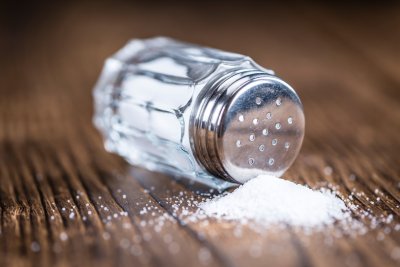Shaking up government action on salt
It’s no secret that eating too much salt can have a significant impact on our health, but avoiding it is not easy. This Salt Awareness Week, Lucy Hewitson explains why British Heart Foundation (BHF) is calling on the Government to act decisively to tackle one of the UK’s key risk factors for heart attack and stroke, including considering use of salt levies on unhealthy food.

Excess salt consumption is linked to high blood pressure, which in turn is associated with around half of all cases of heart attack and stroke in the UK. With an estimated 30% of adults in the UK (amounting to 16 million people) living with high blood pressure, it is vital that action is taken to prevent one of its key drivers.
Shaking up the salt already in the food we buy
However, eating less salt is not as simple as just passing up on the saltshaker. Salt is often already in foods we wouldn’t expect, and in higher qualities than many realise. As much as 85% of the salt we eat is already in the food we buy, rather than being added during cooking or eating. As well as items we might think of as salty, such as crisps, processed meats and sauces, essential items like bread and breakfast cereals can also contribute a lot to our salt intake. Nearly 50% of children’s meals sold in the Out of Home (OOH) sector provide at least half of a child’s daily limit for salt – with some dishes containing more than a child’s entire day's worth of salt in just one meal - according to a new survey by Action on Salt.
Currently, our food environment is set up in such a way that we are driven towards cheaper, and often more unhealthy options, which tend to be high in fat, salt and sugar (HFSS). Advertising plays a big part in this and children living in more deprived areas may be more exposed to adverts for less healthy food. Healthier foods are over twice as expensive calorie for calorie than less health foods, with 33% of food and soft drink advertising spend going towards confectionery, snacks, desserts and soft drinks compared to just 1% for fruit and vegetables. According to the Food Foundation's Broken Plate report, the most deprived fifth of the population would need to spend 50% of their disposable income on food to meet the cost of the Government-recommended healthy diet. This compares to just 11% for the least deprived fifth. The only way to address this is for the Government to introduce a comprehensive set of policies aimed at improving our food environment, including to limit the advertising of HFSS foods, and to ensure the food industry are incentivised to reformulate their products to make them healthier.
Benefits of reducing salt consumption
In 2022, BHF published modelling assessed the potential health and economic benefits of a reduction in salt consumption across the UK population. The results showed that, if everyone’s salt consumption were to be brought in line with UK maximum intake guidelines (6g a day) by 2024, and those recommended by the World Health Organisation (5g a day) by 2030, there could be up to 1.4 million fewer new cases of high blood pressure, up to 135,000 fewer new cases of coronary heart disease, and around 40,000 deaths avoided. Not only would meeting these targets deliver significant health benefits, but it would also bring considerable economic benefits. The model predicts that reduced use of the NHS and increased productivity from both patients and informal carers could generate savings of up to £11.4 billion between 2021 and 2035. But how do we achieve the gains that a shift in salt reduction could promise?
As a member of the Recipe for Change campaign, we are calling for a sector-wide levy to help rebalance the food environment, so healthier food is more available and affordable across the UK. There have been various suggestions for how Government might design such an intervention – including a wholesale salt and sugar levy as recommended in Henry Dimbleby's National Food Strategy. Modelling commissioned by the Recipe for Change campaign has shown that the latter could prevent over 1 million cases of cardiovascular disease and provide gains of up to 3.7 million quality adjusted life years (QALYs), worth up to £77.9 billion to the economy over 25 years.
Regardless of the mechanism to drive reformulation, there is a clear consensus across the sector that action is urgently needed.
Time for Government to shine the spotlight on salt reduction
Efforts to reduce salt intake in the UK delivered significant success in the early 2000s, but industry progress in more recent voluntary reformulation programmes have stalled. The current voluntary salt reduction programme, which set new targets in 2020, is coming to an end this year. Whilst a progress report was due in 2022, it has yet to be published, meaning we cannot evaluate how well industry are currently doing to reduce high levels of salt in different food categories. It’s extremely important that independent evaluations of these programmes are published, as it allows us to hold industry and Government alike to account.
Health Secretary Victoria Atkins has insisted that prevention is a priority for the Government, so now is the time to refocus the spotlight on salt reduction. The NHS is already under unrelenting pressure, not least with over 400,000 people on a cardiac waiting list in England alone. To relieve future pressure on our health service, it has never been more important that measures to prevent the key drivers of cardiovascular disease – including excess salt consumption – are delivered.
BHF's modelling on health benefits of reducing salt intake
Read more about Salt Awareness Week 2024
Find out about Recipe for Change
Published Tuesday 14 May 2024
Recipe for Change: Recipe for Change is calling for an industry levy to help make food healthier.





